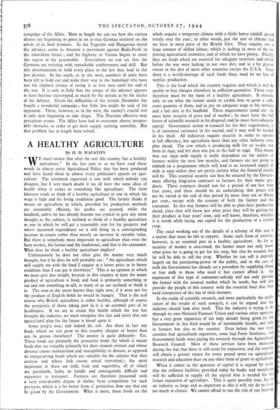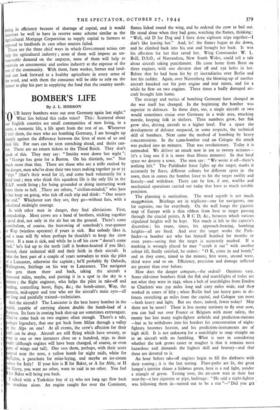A HEALTHY AGRICULTURE
By H. D. WALSTON
" WE must ensure that after the war this country has a healthy agriculture." In the last year or so we 'have read these words in almost every Agricultural Policy that has been produced and have heard them in almost every politician's speech on agri- culture. The sentiment expressed is one with which nobody can disagree, but I very much doubt if we all have the same ideas of health when it comes to something like agriculture. The farm labourer tends to think of a healthy agriculture as one in which his wage is high and his living conditions good. The farmer thinks it means an agriculture in which, provided his production methods are reasonably efficient, his profits are assured, while the landlord, unless he has already become too cynical to give any more thought to the subject, is inclined to think of a healthy agriculture as one in which he will get a reasonable rent for his property and where increased expenditure on it will bring in. a corresponding increase in return rather than merely an increase in rateable Value. But there is somebody more important to agriculture than even the farm worker, the farmer and the landowner, and that is the consumer. What does he think a healthy agriculture implies?
Unfortunately he does not often give the matter very much thought, but if he does he will probably say : "An agriculture which will supply me with the food I require at a lower price or in better condition than I can get it elsewhere." This is an opinion to which we must give due weight, because in this country at least the major product of agriculture is food, and food is primarily something to cat and not something to sell, as many of us are inclined to think it is. The man in the street knows that, right now, if it were not for the produce of English fields he would be hungry. That is the real reason why British agriculture is today healthy, although of course the prosperity of those taking part in it is an essential part of its healthiness. If we are to retain this health which the war has brought the industry, we must recognise this fact and insist that our agricu'Aural plan for the future is based upon it.
Some peop'.e may, and indeed do, ask : Are there in fact any foods which we can grow in this country cheaper or better than can be grown elsewhere? The answer is quite definitely: Yes. Those foods are primarily the protective foods (by which is meant foods that are valuable primarily for their vitamin content and whose absence causes malnutrition and susceptibility to disease, as opposed to energy-giving foods which are valuable for the calories that they contain and whose lack causes actual starvation) ; the most important of these are milk, fruit and vegetables, all of which are perishable, bulky to handle and consequently difficult and expensive to transport. Farmers are therefore presented with a very considerable degree of shelter from competition for such pro iucts, which is a far better form of, protection than any that can be given by the Government. What is more, these foods on the
whole require a temperate climate with a fairly heavy rainfall spread evenly over the year ; in other words, just the sort of climate that we have in most parts of the British Isles. They require, too, a large amount of skilled labour, which is lacking in most of the ex- porting agricultural countries, and of which we have plenty. Finally, they are foods which are essential for adequate nutrition and which before the war were lacking in our own diet, and to a far greater extent in the diet of most other countries except the U.S.A. Since there is a world-shortage of such foods 'there need be no fear of surplus production.
This is the food which the country requires and which it will be unable to buy cheaper elsewhere in sufficient quantities. These crops therefore must be the basis of a healthy agriculture. It remains only to- see what the farmer needs to enable him to grow a suffi- cient quantity of them, and to pay an adequate wage to his workers and a fair rent to his landlord. Three itequirements stand out: he must have .security of price and of market ; he must have the full forces of scientific research at his disposal; and he must have adequate capital. Government action is essential for his first requirement, it is of enormous assistance in his second, and it may well be needed in his third. All industries require security in order to operate at full efficiency, but agriculture more than any other industry must plan ahead. The cow which is producing milk for us to-day was born in 1941, and her dam was put to the bull in 1940. This means that our 1950 milk supply is really dependent on the actions of farmers within the next few months, and farmers are uot going to embark on a programme which will lead to an increased supply of milk in 1950 unless they are pretty certain what the financial results will be. This essential security can best be ensured by the Govern- ment offering long-term contracts to farmers for their major pro- ducts. These contracts should run for a period of not less than four years, and there should be an undertaking . that prices will not be varied at the end of that period by more than ten or fifteen per cent., except with the consent of both the farmer and the consumer. In this way farmers will be able to plan their production ahead, since they will know just what price they will be getting for their produce in four years' time, and will know, therefore, whether it is worth while laying out capital for the production of a certain crop. The exact working out of the details of a scheme of this sort is a matter that must be left to experts. Some such form of security, however, is an essential part in a healthy agriculture. As .far as security of market is concerned, the fanner must not only know what price he is going to get for his crop, but also be assured that he will be able to sell the crop. Whether he can sell it depends largely on the purchasing-power of the public,' and in the case of milk the Government has already set a precedent by supplying cheap or free milk to those who need it but cannot afford it. An expansion of this type of consumer-subsidy will not only provide the farmer with the assured market which he needs, but will also provide the people of this country with the essential food that they need irrespective of the size of their incomes.
In the realm of scientific research, and more particularly the appli- cation of the results of such research, it can be argued that the industry 'should look after itself. 'Nis the industry is trying to do through its own National Farmers' Union and various other agencies, but a very great expansion of the help already being giVen .by the Government in this field would be of inestimable benefit, not only to farmers but also to the country. Even before the war most counties had agricultural organisers, some had Farm Institutes, and Government funds were paying for research through the Agricultural Research Council. Most of these services have been increased during the war, but there is still room for expansion, and the country will obtain a greater return for every pound spent on agricultural research and education than on any other form of grant to agriculture When it comes to the question of capital it is argued by many that the ordinary .facilities provided today by banks and merchants will be sufficient to supply all the capital that is needed for the future expansion of agriculture. This is quite possibly true, but in an industry as large and as important as this it will not do to leave too much to chance. We cannot afford to run the risk of our farming
losing in efficiency because of shortage of capital, and it would therefore be well to have in reserve some scheme similar to the Agricultural Mortgage Corporation to supply capital to farmers as opposed to landlords in case other sources failed.
These are the three chief ways in which Government action can help the agricultural .industry ; none of them will impose an un- reasonable demand on the taxpayer, none of them will help to maintain an uneconomic and useless industry at the expense of the rest of the community. With them, farm worker, farmer and land- lord can look forward to a healthy agriculture in every sense of the word, and with them the consumer will be able to rely on the farmer to play his part in supplying the food that the country needs.



























 Previous page
Previous page